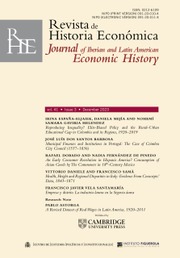As usual at the beginning of the year, we publish our traditional editorial note. We present basic statistics and data concerning the evolution of the Journal in 2023. The RHE-JILAEH received 45 original research papers in 2022 (two of them were research notes). Figure 1 presents the evolution since 2018. We observe an important decrease in 2021, with a strong recovery in 2022 and a minor decrease in 2023 with respect to the number of articles submitted. Given the importance of disseminating databases, we have included a specific reference regarding the Journal's interest in publishing explanatory notes on databases in the author guidelines, and we published a note to this effect in the last issue of 2023.

Figure 1. Number of original articles submitted to RHE-JILAEH, 2018-2023.
In comparison with 2022, in 2023, there was an increase in submitted articles dealing with Latin American history, accounting for 42% of the total submitted articles. Articles on Spanish and Portuguese economic history represent 38% of the total submitted articles. Additionally, we observed an increase in the percentage of original research papers on global economic history from 18% in 2022 to 20% in 2023.

Figure 2. Regional Distribution of Topics. Total submissions in 2023 (%).
Table 1. Geographical Distribution and Topics of Articles in 2023

Table 2. Statistics for evaluation periods and the state of original research papers during 2022
STATISTICS FOR EVALUATION PERIODS AND THE STATE OF ORIGINAL RESEARCH PAPERS DURING 2023


GEOGRAPHICAL DISTRIBUTION OF TOTAL ARTICLES IN 2023

REJECTION RATE

In terms of length of evaluation periods and Editors’ acceptance or rejection, there were not substantial changes with respect to 2023.
According to the 2023 JCR Social Science Edition, the impact factor was lower than the previous year. If we use the impact factor (JIF), which has only one decimal now, it stands at 1.0. Conversely, if we look at the evolution of the JIC index (which does not consider self-citations), the trend is much more favorable, standing at 1.89. As Clarivate has explained, this year there has been a widespread decline in the impact factors of almost all journals due to the anomalous increase in indicators that occurred during the 2020-2021 period due to increased publication associated with COVID-19. Despite the decline in this year's JIF, considering that the index was 0.581 in 2019, the Journal's impact trajectory over the past years is very favorable. We remain in Q1 in the History category, which includes ‘History of Social Sciences’ as well as ‘History’. In the case of ‘History of Social Sciences', we are again ranked as the fourth most impactful journal behind ‘Economic History Review', ‘Journal of Economic History', and ‘Explorations in Economic History’. In the ‘Economics and Business’ category, however, we revert to the Q4 category. The team of editors will make every possible effort to improve the impact factors, and want to thank the extraordinary collaboration of the referees of the RHE-JILAEH, whose names are listed at the end of this editorial note.
RHE-JILAEH
ACKNOWLEDGEMENT TO REFEREES IN 2023








